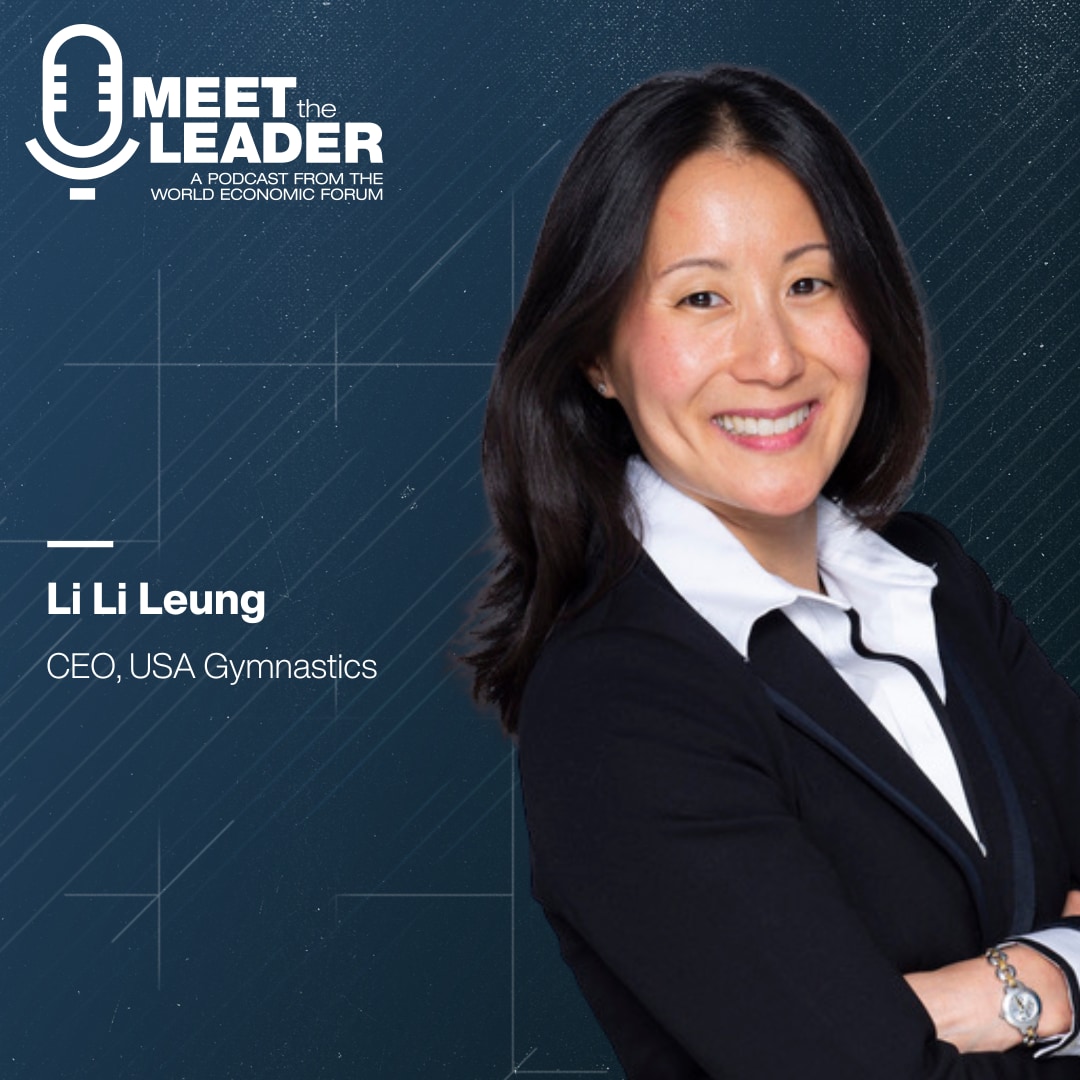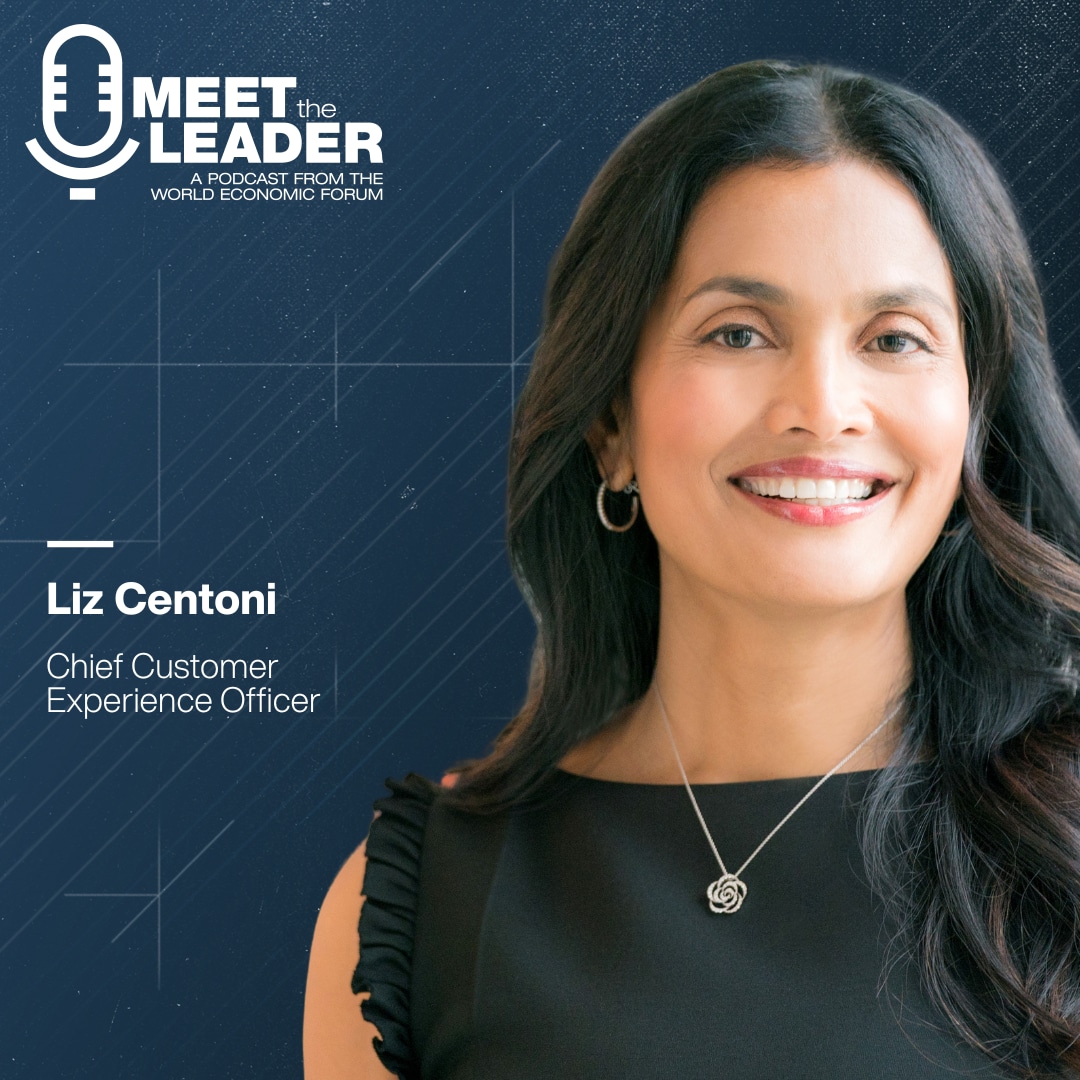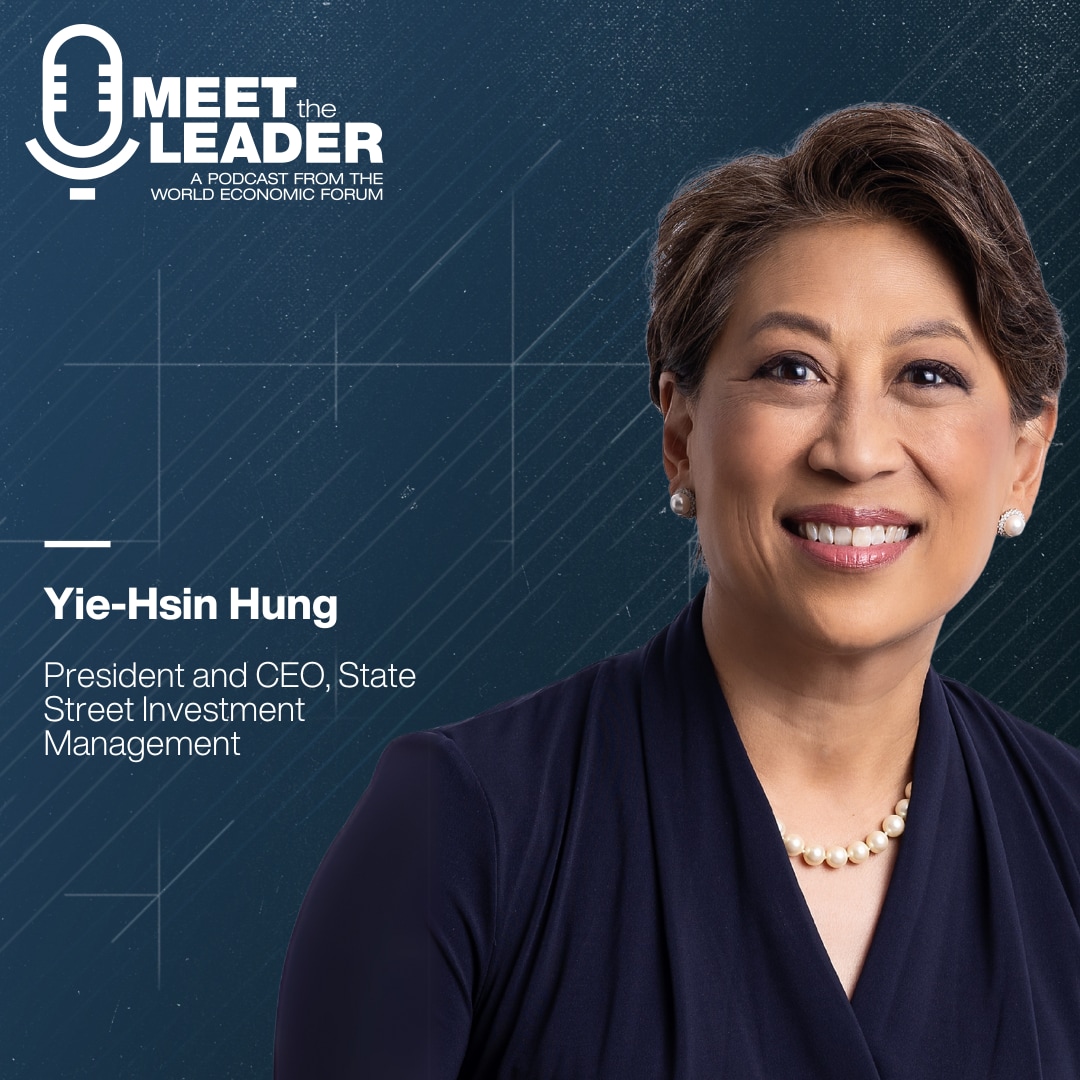What workers really want - and how it can bridge the gender gap: Reshma Saujani, Moms First
Forget snacks and gym memberships. Today's worker wants to know you value their family. When Reshma Saujani founded Moms First -- a movement to drive paid leave for families -- she already had a successful non-profit under her belt in Girls Who Code. But she quickly learned that advocating for moms and parents uncovers a host of structural barriers that hold back both women and families -- ones leaders can help overcome.
In a special conversation recorded at the 2024 Annual Meeting in Davos, Switzerland, she shared how leaders will need to focus on their teams' families to stay competitive and to bridge a host of gaps -- including gender pay gaps and labor shortages coming down the pike. She also shared how a special AI-powered tool her organization built -- PaidLeave.AI -- is helping thousands better understand leave benefits in New York State and showing how new technologies can expand opportunity in surprising ways.
Podcast transcript
This transcript has been generated using speech recognition software and may contain errors. Please check its accuracy against the audio.
Reshma Saujani, Moms First This was a problem that was relatable, that people had experienced, but it was something that was in the margins. It was something you talked about with your girlfriends, but convincing people that it was an economic issue, not a personal issue, was not as easy as I thought it was going to be.
Linda Lacina, Meet The Leader Welcome to Meet the Leader, a podcast where top leaders share how they're tackling the world's toughest challenges.
In today's episode, we talk to Reshma Saujani, the serial founder from Girls Who Code and Moms First. She'll share why leaders who care about productivity will need to keep their teams' families top of mind.
Subscribe to Meet the Leader on Apple, Spotify, and wherever you get your favorite podcasts. And don't forget to rate and review us. I'm Linda Lacina and from the World Economic Forum and this is Meet the Leader.
Reshma Saujani, Moms First The world I'm proposing is not a utopia. It's Belgium.
Linda Lacina, Meet The Leader You might know Reshma Saujani from Girls Who Code. That's a nonprofit that she started in 2012 to help get more girls into tech careers.
But the pandemic shone a big, unflattering light on a gap of a different kind: The caregiving gap. Women often take on unpaid labor like childcare and household chores. But with daycares closed and schools remote, women took on these roles while trying to hold down full time jobs. That juggle has never been easy. But during the pandemic, it was simply impossible. Millions of women left the workforce worldwide and many still haven't returned.
That care gap was so stark in the first year of the pandemic, December 2020, Reshma founded Moms First. That's a movement to land paid leave for childcare in as many places as humanly possible.
The group has already developed a special AI-powered tool, one with a little help from her friend Sam Altman, and it has helped thousands of women in New York state understand their options of eligibility for paid leave, keeping them at work and keeping food on the table.
She shared what is needed to scale that work further. Critically, she shared how the world could be different with paid leave in place. (Spoiler alert: it is a place where we are on pace to bridge the gender gap since more women are poised for leadership roles. It's also a world better prepared for a very real labor shortage that's right around the corner.
She'll talk about all of this. Including why launching a tool for moms is a little harder than launching a nonprofit for girls. But first I'll have her talk more about Moms First and how it got started.
Reshma Saujani, Moms First Moms First is a movement to pass paid leave and childcare and get it in as many places and spaces as possible.
And it was founded because oftentimes in America, we treat moms as a social safety net. When everything broke down during the pandemic and daycares were shut down and schools were shut down, it was moms who both did the unpaid labor and kept their full-time jobs. And, you know, this happened again in a moment where America is the only industrialized nation that doesn't have paid leave. So the vast majority of women go back to work several weeks after having a baby.
America is the wealthiest nation that spends the least amount in childcare. That means that 40% of parents go into debt to pay for childcare. They pay more for their childcare than they pay for their mortgage. And so when we think about why the United States has the most educated population of women that have the least amount of participation in the labor market, it's not because we don't have confidence. It's not because we don't have enough mentors or sponsors or we didn't do enough power poses. It's because we don't have the structural change that we need, as women and as mothers. And that means paid leave, childcare and equal pay for equal work.
When we think about why the United States has the most educated population of women that have the least amount of participation in the labor market, it's not because we didn't do enough power poses. It's because we don't have the structural change that we need, as women and as mothers. And that means paid leave, childcare and equal pay for equal work.
”Linda Lacina, Meet The Leader One of the early names forMoms First was the Marshall Plan for Moms. And I like that language. Can you tell me why you chose Marshall Plan for Moms?
Reshma Saujani, Moms First During the pandemic, what happened is that 11 million women were pushed out of the workforce. So when we started, the pandemic in the United States, it was the first time that there were more women in the workforce than men. You know, we were flying our feminist flags high. And then the pandemic happened. And because daycare centers were shut down and schools were shut down, moms couldn't rely on grandparents to come in and take care of their siblings or their caregivers or their nannies or teachers. And so they had to both maintain their full time paid work and their unpaid labor. And it was untenable. And so you saw 11 million women get pushed out of the workforce. And our participation got back to where it was in 1989.
And so I remember thinking to myself, "Wow, it took us decades and decades to get to the point where we were actually at parity." And so we can't think that this is an on and off switch. Right? It's going to take years to get back to where we were before the pandemic.
I remember thinking to myself: "What's the plan? Like what's the plan?" And that's where this, I wrote an op-ed called We Need a Marshall Plan for Moms, you know, again, kind of taking from World War Two when you had bombed-out cities and you needed a real kind of 360 plan to think about how we were going to do economic recovery. And it felt like we needed the same thing for America's mothers and, quite frankly, mothers across the globe.
Linda Lacina, Meet The Leader Well, I think what's interesting about the term Marshall Plan for Moms is also that it sort of conjures up like, "hey, we're in a crisis," right? There's news here. So I think that's to me is what's really, really helpful to get people to pay attention.
Reshma Saujani, Moms First It's so interesting that you say that because now we're years away from the pandemic and we still haven't made those structural changes. And so mothers are still struggling to stay in the labor market. So many of them have downshifted their careers, changed jobs, are barely hanging on. We have a mental health crisis for mothers in the United States where alcoholism rates, drug rates have skyrocketed, suicide rates have skyrocketed, higher than they've ever been.
Before the pandemic, I think so many people thought, well, if I'm not able to balance my career and my family, something's wrong with me. I married the wrong person. I just don't have good organization skills. Now you realize, wait, it's it's not me. It's the structure. It's the policies in this nation that do not support me. And you're looking around and you're looking for help. You're looking to be seen. And I think that that is why now so many mothers, so many have moved into consciousness of understanding that the system is broken and that something needs to be done.
Linda Lacina, Meet The Leader Moms First launched a first-of- its-kind AI tool called PaidLeave.AI. Why don't you tell us a little bit about that - What it does.
Reshma Saujani, Moms First Yeah. So, you know, I, was wearing two of my hats, you know, founder of Girls Who Code, built the largest movement of women in tech. And then thinking about how do I bring about childcare and paid leave and how do I get that passed in America?
And we're having this conversation about artificial intelligence, and we're talking about risks and we're talking about safety concerns. And all of those are very valid. And we're also talking about how artificial intelligence, if it does replace workers' jobs, the money that you get from AI can be used towards basic income, that that's the way you actually close the poverty gap. And I remember thinking, wait a minute: what if you actually use GenAI to close the poverty gap in and of itself as a tool?
And what I wasn't seeing at that moment was any kind of public sector solutions using generative AI. And I thought about the work that I was doing on paid leave and how in my state, New York -- New York is one of the 13 states that offers paid leave in America. But the problem is, in New York, the uptake of paid leave is only 20%. And what I mean by that is only 20% of those that are eligible for paid leave actually apply to get them.
And the reason is, as you go on our state website, and it's so confusing and complicated. And if you're a single mom working in retail you have 15 minutes to figure this out, you just give up. And so, so many people give up, which means food doesn't get put on the table because they lose that $10,000 in wages that they would have received or gotten in benefits. And now have to take their vacation days or sick days or lose those wages.
And secondly, what happens is the lack of uptake is leading to the failure to pass a federal bill because people in Washington say, well, wait a minute, why should paid leave be one of the top three things we spend our budget on when if I look at the states that do offer it, people aren't taking advantage of it. It must mean that they don't really want it.
And so that's why having high levels of uptake is critical for the federal passage.
And I pinged my friend Sam Altman, you know, at OpenAI...
Linda Lacina, Meet the Leader As one does
Resha Saujani, Moms First. As one does. And I said I have an idea. And he was like, I love it. And, you know, connected me to the team. And then they connected us to this amazing development team called Novy.ai. And we kind of got our heads together. We had some focus groups with moms. We dug in and we said, what could something look like that would actually really help parents?
And we launched PaidLeave.ai. We launched it just for New York State in December. And, you know, basically within the first few days, we 25,000 parents get on the website. It had just gone viral. And you realize that -- so many moms said to me, you know what, thank you for this. I didn't feel like I could go into my employer's office and ask the questions that I had and how to apply. Or I just found out that I was pregnant and I was terrified or confused.
And so when you go to PaidLeave.ai it offers you a bunch of prompts in every language (which is also really, really important and powerful). I just found out I'm having a baby. My employer offers some paid leave. How many months do I get? And so it very simply tells you: are you eligible? How much money can you put in your pockets? And it gives you an action plan of what to do next.
Linda Lacina, Meet The Leader What is needed to to scale that further?
Reshma Saujani, Moms First Well, we're going to scale it further in all 13 states, that do you know that do actually offer it, and DC.
A couple of things I learned from building this and putting this out there in the world. The first thing is, is that government does a really bad job at customer service. And generative AI can actually do a great job in increasing trust between citizens and governments. By enabling you to get the benefits that your taxpayer dollars, quite frankly, have paid for.
The second thing I learned is that this tool is applicable to so many different things, like the earned income tax credit or SNAP or health care, or unemployment insurance. Right? And so that one of the things that we wanted to do by launching this tool was to inspire others to innovate. Like, AI will only be as good as we are. And so if we sit in the fear of the concerns that we have about AI and that prevents us from innovating, we're not going to actually make progress.
And that's my third point. I believe that I can do so much good. I think it can solve our biggest problems. And I think it can empower women, people of color, poor people, who don't often have access to technology to be on the front line of creating the next set of tools.
And so we want to expand this across all 13 states, but we also want to dig in and prove and show that the tool does increase the uptake of benefits. It does actually fix pain points for families that are navigating the website, whether they're in New York or in California or in New Jersey or in, you know, Minnesota, which are other states or that offer pay leave or will be offering paid leave.
And then we want to put a numerical value on that. So it's not just a $10,000 in wages that you'll get because now you now got that benefit. But all the downstream and upstream benefits that you have that you could actually economically measure: better health outcomes for families, better job outcomes for families. What is the amount of money that we're really saving? And how good of a job are we doing in closing the inequality gap by these tools.
Linda Lacina, Meet The Leader. If this tool were available in all 50 states, what would change in the US?
Reshma Saujani, Moms First Well, you know, first of all, I think, there's only 13 states that offer -- have paid leave, so it can only be available in 13 states.
Linda Lacina, Meet The Leader Let's imagine
Reshma Saujani, Moms First Let's imagine.
Linda Lacina, Meet The Leader Let's imagine this fantasy science fiction world.
Reshma Saujani, Moms First I mean, it would change the lives of millions and millions of families. It would help them put food on the table. It would help them not have to choose between taking care of their careers and taking care of their families.
It would give them the resources that they need to put their kids in school, buy them toys for Christmas, right? Change the trajectory of their lives. I think it would build a movement of people that would fight for federal paid leave, that would fight for better care policies for families because they would realize because, you know, the thing is, is like when you get paid leave, paid leave is not just about I just had a baby and now I can have time. Paid leave is also when my father is dying, and I need those two, three weeks to be able to take care of him and make sure that I help him pass from life to death. You know, I mean, in a moral, humane way.
Those are moments in life that you never forget. And if you're able to be given those moments in life from a perspective of compassion and morality, you want other people to have those moments, too. And that's what we need right now.
You know, right now there is consensus between Democrats and Republicans that want paid leave, that want affordable childcare, that want good care policies. But there isn't the will, you know what I mean? To actually pass this because I think our legislators in Washington and even across the globe are just not prioritizing what families want. So that movement of people needs to get real loud and real big.
Linda Lacina, Meet The Leader It was interesting you said that. I wonder too, what do you think the impact to the U.S. economy, but also retention for women because they're not in this binary position where they have a life milestone moment --, whatever that is -- and they feel like, well, I'll just need to leave my job.
Reshma Saujani, Moms First Reading Claudia Goldin's book, she just won the Nobel Peace Prize, right? On her work that she's done on career and women. She answers a question, right? Which is like, you know, the United States has the most educated population of women that have the lowest participation in the labor market. And like I said, it's not because of, we don't have enough skills or we're not confident enough. It has to do with the fact that the vast majority of us, by the time we're 40, 80% of us will become mothers. And we've never created a workforce or a workplace or society that allows you to balance both of these identities. We force you to pick one or the other. Right? And that has kind of led to this moment, where we have the lowest amount of participation. We have all of this turbulence that women feel. I think when you pass these policies, that begins -- and you focus on passing these policies -- that begins to shift.
By the time we're 40, 80% of us -- will become mothers. And we've never created a workforce or society that allows you to balance both of these identities.
”Linda Lacina, Meet The Leader You had mentioned that. Hey, maybe one of the benefits of this is also that it can inspire people to create other tools. We're still at a point where we're at a little bit of a skill gap with AI. People need to learn up how they can contribute, how they can bring themselves to it. In your mind, somebody listening to this, what should they be exploring, doing? You founded Girls Who Code. But there's also some people who might not need to do programing in order to contribute. Somebody listening to this, how can they upskill themselves to help?
Reshma Saujani, Moms First Love this, One of the things I love about this tool, too, is that so right now there's a gender gap between people who have actually used ChatGPT before, right? So I think it's like 48% of men, 36% of women. And what I love about PaidLeave.AI is the vast majority of those using it are women. And if you go in the comment section on Instagram, it's like, oh my God, I never thought I'd understand GenAI, and I do now. You're taking what people have kind of built up as something that they don't understand or cannot do and demystifying it. And so I think people should go to PaidLeave.AI and play around with it and kind of understand what GenAI is.
Secondly, we all have to get better at prompt engineering because if GenAI kind of takes over the world, humans are going to be only as good as we know how to prompt. And so that's an upskill that people need to really learn is, is what are the questions that I should ask to really make sure that AI can augment my intelligence?
Linda Lacina, Meet The Leader In general, as leaders or even as workers, people running our own careers, the questions that we ask are sort of imperative to the answers we seek in life. In your mind, what's needed for that -- to ask the right questions?
Reshma Saujani, Moms First What's needed to ask the right questions, I think, is for us to continue to stay kind of in relationship with one another. I think about my eight-year-old son who's just like, playing games all day long, right? Part of where I learned what questions to ask or I learned about curiosity is in my interactions with other humans. So we have to stay present with one another. We have to stay in community with one another. And, and I do think that, as AI begins to kind of be a part of every aspect of our life, we are going to have to teach people what prompts to ask.
Linda Lacina, Meet The Leader Are there AI tools that can help working parents, that they should look into?
Reshma Saujani, Moms First Well, there's starting to be a lot, There's there's a handful of tools that are going to help close the cognitive labor gap or the unpaid labor gap, like Milo, you know, and Ohai.ai, which are going to help parents and give them more time by using GenAI to kind of take care of some of the tasks that they don't have to do.
I think you're seeing a lot more tools, you know, Parent GPT. it helps you kind of ask questions about breastfeeding or how do I get my baby to sleep? You're seeing a lot more tools, which I think are important on education. You know, Emily Oster, who's a friend of mine, just released a tool called Zelma. Right? Which is going to help parents decide what school they should choose? Because, listen, every parent I know, since the pandemic, is really focused on the kind of opportunity gaps that they're seeing in their kids' education, and if you have an AI tutor, that can really focus on the gap that your child has, that can help upskill them very fast.
Linda Lacina, Meet The Leader You had already built a successful organization for women when you had, went into Moms First. But still, building anything has unexpected obstacles, barriers and things like that. Was there a moment where you you hit a wall in building the PaidLeave.AI, and how did you get through it?
Reshma Saujani, Moms First I think there was definitely a moment where you want to do a lot of different things. Right? And I think we had to step back and say, okay, what if I had to go on, what's the simplest thing that I can deliver to parents? What would I really want to know? Am I eligible or not? Do I get it or not. And if I get it, how much money am I getting? And then can you help me, like give me an action plan or like, what are the next steps?
And I think in the beginning, you know, we did some focus groups with moms. There are lots of things that you want to solve for. And, we took a look at the prototype like, "oh wait, this is too confusing." And look, I still would say that we're in the beta phase in terms of, like, as we go out to the next 13 states, it's going to iterate and iterate and iterate. It's going to get better and better and better. It's going to get more and more and more effective.
I think the other thing is, measurement is very important to me. Everything I've built, I've been able to clearly say, am I doing well at this? What's the ROI on this? What are my KPIs? And so on this tool -- I didn't want to just release something that was really interesting and great to talk on, you know, podcasts or conversations like this. I wanted to actually change lives. And so now we're really kind of drilling down on how can we actually measure the dollars that we're putting into people's pockets?
For me, as a social entrepreneur, though, as I was building Moms First, generally, I was coming off of building Girls Who Code. I had built one of the largest women and girls nonprofits in the world. I'd raised $100 million over ten years. My team and I had kind of shifted the narrative in the conversation of girls and technology, and I came into building Moms First. I was like, "oh, this is going to be easy. I know how to do this." And, you know, it was a real eye opener, right? In many ways, solving the problems of moms is different than solving the problems of girls. It's often easier to get people to invest in helping girls than it is and helping women. This was a problem that was relatable, that people had experienced, but it was something that was in the margins. It was something you talked about with your girlfriends. But convincing people that it was an economic issue, not a personal issue, was not as easy as I thought it was going to be.
It's often easier to get people to invest in helping girls than it is and helping women. This was a problem that was relatable, that people had experienced. But convincing people that it was an economic issue, not a personal issue, was not as easy, you know, as I thought it was going to be.
”You know, you had to communicate something in a way that wasn't so big. There were so many times I would stand in the room full of like 10,000 moms, and they would look at me like I was nuts. And I would say, you know, the the world I'm proposing is not a utopia, it's Belgium. You know, I mean, it's the Netherlands, it's Sweden, it's Canada.
But, for so long, I think if you have experienced motherhood in a certain way, you don't think you deserve more. And for me, thinking about what I needed to do or say, to help make that shift in people's consciousness, was definitely something I spent a lot of sleepless nights trying to just have that "aha" unlock moment.
And that's why I think tools like PaidLeave.AI, you know, to have Sam Altman and Open.AI, like this be one of the things that they're building, you know to have Sam be like paid leave us we should fix that is really critical, right? Because, you know, he's a leader that people really respect.
And so, again, I think it's like I've learned a lot. I understand why some people don't do this a second time around, You know what I mean? Because it's hard. But I every day wake up so grateful to work on a topic that I feel so passionately about. I see that hope is on the horizon. I see that change is on the horizon. I see that it's coming. And I feel so grateful that I get to dedicate my minutes, my hours of my time on making change that is going to happen.
Linda Lacina, Meet The Leader People listening to this, leaders listening to this, they'll be inspired to want to do more for parents. And they may not realize that they aren't doing enough, that there are these gaps. If I'm listening to this and I want to put something in place for the working parents on my teams, what's something tangible, specific, that would be very useful and appreciated by working parents.
Reshma Saujani, Moms First Parents, childcare, do something on childcare. You don't have to go build a childcare center. If you do that, great. But do something. It might just be providing backup care. Not penalizing flexibility or remote work when there's a crisis, or when you just want to spend a little more time with your kids. It's providing childcare subsidies.
I really think that the thing that that families are going to care about, especially this millennial generation, is how you treat their families. It's not going to be about like, do they have the best snacks? Or pay for my gym membership? It's going to be like, can I actually be an active dad? Can I take Johnny to school or be the coach of his little league? Or take time when he's sick. And are you still going to offer me my promotion? Are you still going to value my work? Are you still going to value me. And value me means value my family and my family responsibilities, and not forcing me to choose between those identities.
Linda Lacina, Meet The Leader Why is it that people aren't connecting the fact that women need to leave the workplace disproportionately to care for children or for, like parents, etc., etc.. Well, why is there not a connection between that and, gaps that are causing the labor shortage? Why is there not this connection that hey, if I created more solutions for childcare, eldercare, etc., maybe I could retain people and I could, whatever, have continuity, have leadership, I could promote people and also maybe help tackle some of these long term issues.
Reshma Saujani, Moms First Listen, that is a really great question because the thing is, is I would argue maybe before the pandemic, they didn't know. And the narrative we would tell ourselves, was "well, women just want to be at home with their kids." They're just, once they have a baby, they just don't care about their careers as much.
And now we realize, we have to realize, because we saw it on our Zoom screen, that that is not the reality. And we've also seen that, we know what to do. We know that if you offer remote work or flexible work, that things will not end. Girls Who Code, 95% of my employees were women and they had babies -- people had children all the time. And we were the greatest.
Etsy, Patagonia, so many companies out there that have always centered families and children in childcare and paid leave, and they're crushing it from a productivity perspective.
So that's a great question: why is there resistance to this? And, you know, Claudia Goldin talks about it. She calls it greedy work. Part of American culture is you're always on, you're always available. You're working all the time, even if it's face time.
And so we have to in some ways let go of that a little bit and recognize that when there's life moments where people need that flexibility in that time, that might mean it's the first five years of a child's life. That parents need that, too. It's only a gender thing because I think it's like we've been doing the unpaid labor and from a societal perspective, they see that as our responsibility. But I think what's shifting is that in heterosexual couples in particular, they're telling you that they want something different and basically both genders want to be able to spend time with their kids.
Linda Lacina, Meet The Leader 2024, we have a year ahead. in lot of ways, the Annual Meeting helps get people thinking about what is the agenda for the next year. We've seen there's a host of risks from our Global Risks Report. But in your mind, what are you worried about? What do you want to move forward this year that, will set us up for the next decade or two?
Reshma Saujani, Moms First I think we can't keep having conversations about gender inequality without centering care, period.
And I think that there's been so many conversations we've had about upskilling or the technology gap, or skills gaps. I think if we can commit to say we're actually globally going to make policy changes on care and then quantify what the impact of that is on women's labor market participation. That would be incredible.
Linda Lacina, Meet The Leader How would the world be different, in 10, 20 years if we actually got that commitment.
Reshma Saujani, Moms First You wouldn't have a gender gap, period. You'd have full participation of women in the labor force. You wouldn't have a poverty gap with children because children would be getting adequate care. You wouldn't be bankrupting global economies because they haven't done anything on elderly care, which is coming.
And so kind of all of these crises that we're either in the middle of or we're at the cusp of either are not going to happen, are going to be fixed because we've centered care.
Linda Lacina, Meet The Leader That was Reshma Saujani. Thanks so much to her, and thanks so much to you for listening.
Find a transcript of this episode, as well as transcripts from my colleague's episodes of Radio Davos at wef.ch/podcasts.
If you like this episode, please let us know. Take a moment to rate and review us. We would love to hear from you.
This episode of Meet the Leader was produced and presented by me, with Juan Toran as studio engineer and Gareth Nolan driving studio production.
That's it for now. I'm Linda Lacina from the World Economic Forum. Have a great day.









